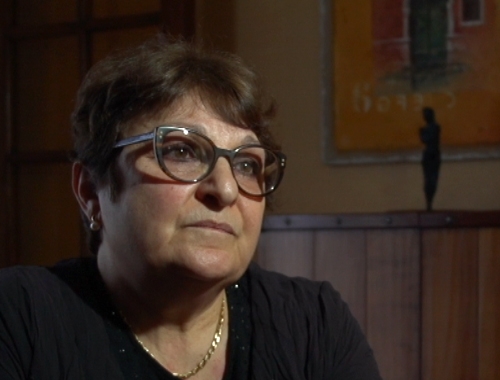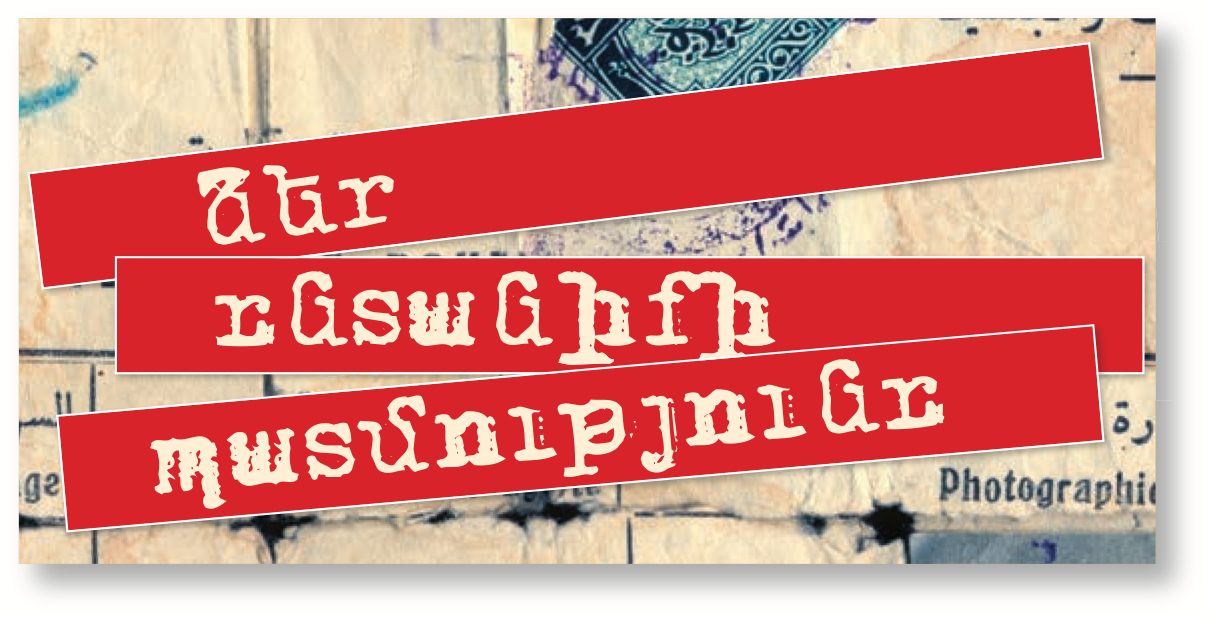 Parents immigrated to Armenia in 1947
Parents immigrated to Armenia in 1947
Anahit Antrigian
Hagop – I was six when we came to Armenia. My grandfather and mother wanted to live in the homeland. They sold the house at the last minute and left for Armenia on the last convoy. The police in Marseille didn’t let me and my other sister, Marineh, get on the ship. They said that they wouldn’t let anyone go who was born in France. Our family paid them money and they let us pass. My brother was born on the ship. They named him Haghtanak (Victory). He died in Armenia from milk poisoning. Anahit was born in Armenia.
Anahit – When I was born, everything was difficult for them. My mother told me that I was waiting for you. We had no food. Grandmother said, “Don’t leave her in the rear. That child will get nothing to eat.” It all passed. Such is life.
Hagop – We sold all our stuff to survive. It was a black market for everything. Even the bread was black, I remember. We would make toys out of that black bread.
Anahit – I was five or six. There was no food, no bread. When I was small my grandmother would take me and say, “Go get some bread. You’re young. You can pass through.”
Hagop – We lived in Yerevan’s Malatia neighborhood. The Malatia Hospital is there now. It was a desert before. They gave us the animal sheds of the kolkhoz. No problem. It was alright. There were some rooms. What else could there be back then?
Anahit – Grandfather really wanted to live there, in Malatia. They were actually from Malatia. But it wasn’t their country when they went. It was a Russian country.
Hagop – I went to the first grade at the Malatia school. When I say school, it was in a house.
Anahit – My school was good. I liked the school there because the teachers were good. Then, I started to do gymnastics there. I liked living there. It’s just that I knew we weren’t free. Other than that, I liked living there. But no, no, I’m glad that I came here. Wherever I live, it’s good for me. I’m good with other people. No, I liked France much more than Armenia, because you can do so much more here than there.
Then too, in Armenia, everything was in Russian. Do you know that they spoke Russian on the radio? Everything was in Russian. The television was in Russian. Yep, there wasn’t much in Armenian. They didn’t speak Armenian that much. But now, I believe, it’s all changed. Right?
Hagop – Our family would secretly listen to Monte Carlo Radio and the Voice of America. They’d take me out of the room when they put the radio on. They’d tell me to walk around the house so that no one could hear. I was young. I wandered around the house…It was during the Stalin era. The road to Siberia was prepared.
I remember that a black car would drive through the neighborhood; the windows and doors were all shut. Everyone was scared. “They’re taking people to Siberia,” they said. They detained my father for seven days. But they didn’t send him to Siberia. He had gone to the border near the Arax River to buy a house. He was detained on the way back. He fell ill after being released. My father was scared.
Anahit – Everything scared people given when Stalin was alive. You couldn’t say anything or do anything. My father couldn’t work at home. When my father made us pants, he didn’t have the right too. He was a tailor but couldn’t do his job. They didn’t let him.
Hagop – My father started working in a factory making patterns. I worked as an assistant laborer in the same place. Then I stopped working. The neighborhood police came around and asked me why I wasn’t working. I told them that my papers had arrived for us to go to France. They said, “If you don’t work how can you live? No, you will work. We will send you to Kajaran.”
Anahit – I remember that it was hard living with the communists. Living there was difficult. When we came here, I saw that things were different. People lived freer. Everything is free.
But I was very happy in Armenia. I liked living there very much since we had a house. Everything was there. My father and mother were good people. So were my brother and sister. I felt good there. I had friends; boys and girls. But my father and mother wanted to come here since life there was difficult for them.
Hagop – My grandfather wasn’t happy that he moved to Armenia and fought with his brothers. His brother had moved to Armenia a year before he did. My grandfather was mad at him. “You knew that things are bad. So why didn’t you tell me not to come.”
When they welcomed Christian Pineau (the French foreign minister) to Yerevan, my father went to the demonstration. The news then was announced that Armenians from France could go back. I believe our family first filed a petition to go to France in 1957-1958. They denied us on four or five occasions. Then, my mother went to Moscow and stormed into the French embassy and protested. We arrived in France on May 1, 1966.
Anahit – I was fourteen when we came to France. My father’s sisters and their families had remained here. My grandfather’s brother was in Armenia. All the rest followed us to France. There’s no one left in Armenia. Only my grandmother and grandfather passed away there.
Hagop – We experienced many difficulties here as well until we found work. None of us worked for six-seven months. Later, it got easier for me and my older sister. We were born in France. They didn’t give papers to my father and Anahit, who was born in Armenia. When my father was to leave for Armenia, he said that he didn’t want French citizenship. This is because after the war, when he wanted to open a tailor shop in France, they didn’t let him, saying he was a foreigner. My father told them that he served as a soldier, a volunteer for France. “Then, I wasn’t a foreigner. Now, when I want to open a store and work, I’m a foreigner?”



















